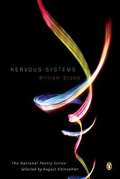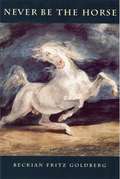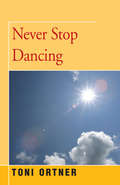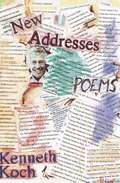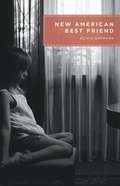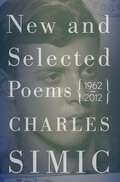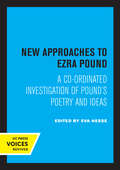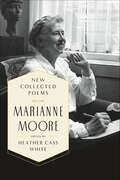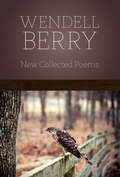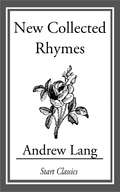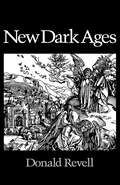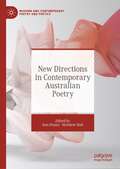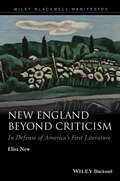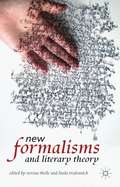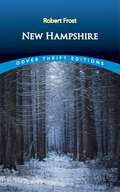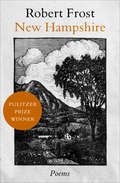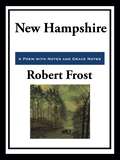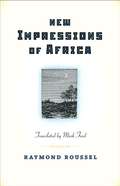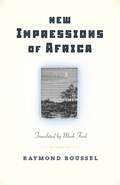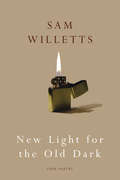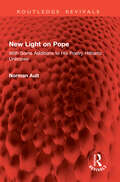- Table View
- List View
Nervous Systems
by William StobbSelected for the 2006 National Poetry Series by August Kleinzahler William Stobb?s poems attend calmly to a dynamic world. Nature, family, and friends are among the shifting systems where Stobb finds poems. His fluency in a variety of forms?from the measured tenderness of Jay Meek to the oceanic surrealism of Donald Revell?enacts the tension between order and entropy in the physical world we live in. ?Stobb has nerve, talent, and engages this madly accelerating, and often nearly indecipherable, world in what?s called real time,? writes August Kleinzahler, ?and he manages it without sacrificing emotional truth. ? .
Never Be the Horse (1st edition)
by Beckian Fritz GoldbergThe poems depict the world of a postmodern Dark Dorothy whose attempts to return home are foiled when she falls into the Garden of Eden, into the underworld with Walt Whitman, into mysterious versions of her own childhood.
Never Stop Dancing
by Toni Ortner"The chapbook is about the experience of being in a mental hospital although it could have been about being in any kind of prison. The specifics are here, and it is well written. "-Judy Hogan, "Motheroot Journal" a women's review of small presses"
Never Tease a Weasel
by Jean Conder SouleReading this book together is an excellent and fun way to learn about teasing. " You can knit a kitten mittens And perhaps that cat would purr. You could fit a fox with socks That exactly matched his fur. ... But never tease a weasel; This is very good advice. A weasel will not like it And teasing isn't nice!" This file should make an excellent embossed braille copy.
New Addresses
by Kenneth KochKenneth Koch, who has already considerably "stretched our ideas of what it is possible to do in poetry" (David Lehman), here takes on the classic poetic device of apostrophe, or direct address. His use of it gives him yet another chance to say things never said before in prose or in verse and, as well, to bring new life to a form in which Donne talked to Death, Shelley to the West Wind, Whitman to the Earth, Pound to his Songs, O'Hara to the Sun at Fire Island. Koch, in this new book, talks to things important in his life -- to Breath, to World War Two, to Orgasms, to the French Language, to Jewishness, to Psychoanalysis, to Sleep, to his Heart, to Friendship, to High Spirits, to his Twenties, to the Unknown. He makes of all these "new addresses" an exhilarating autobiography of a most surprising and unforeseeable kind.From the Hardcover edition.
New American Best Friend
by Olivia GatwoodOne of the most recognisable young poets in America, Olivia Gatwood dazzles with her tribute to contemporary American womanhood in her debut book, New American Best Friend. <P><P>Gatwood's poems deftly deconstruct traditional stereotypes. The focus shifts from childhood to adulthood, gender to sexuality, violence to joy. <P><P> And always and inexorably, the book moves toward celebration, culminating in a series of odes: odes to the body, to tough women, to embracing your own journey in all its failures and triumphs.
New And Selected Poems: 1962-2012
by Charles Simic&“It takes just one glimpse of Charles Simic&’s work to establish that he is a master, ruler of his own eccentric kingdom of jittery syntax and signature insight.&” -Los Angeles TimesFor over fifty years, Charles Simic has been widely celebrated for his brilliant and innovative poetic imagery, his sardonic wit, and a voice all his own. He has been awarded nearly every major literary prize for his poetry, including a Pulitzer and a MacArthur grant, in addition to serving as the poet laureate of the United States in 2007 and 2008.In this new volume, he distills his life&’s work, combining for the first time the best of his early poems with his later works—including nearly three dozen revisions—along with seventeen new, never-before-published poems. Simic&’s body of work draws inspiration from a range of topics, from the inscrutability of ordinary life to American blues, from folktales to marriage and war.Consistently exciting and unexpected, the nearly four hundred poems in this volume represent the best of one of America&’s most distinguished and original poets.
New Approaches to Ezra Pound: A Co-ordinated Investigation of Pound's Poetry and Ideas
by Ezra PoundGreat advances are currently being made in the understanding of Pound's lifework. Many of the essays in this book--the majority are published her for the first time--disclose hitherto unsuspected aspects of the poet's beliefs, while others are studies in depth of areas of his work which, although frequently discussed, have never before been properly examined. Seldom, in fact, have so many pioneering studies been assembled between the covers of a single volume. The various contributors are eminently qualified to treat the specific ideas and interests of Pound's about which they write, and the book as a co-ordinated whole comprehensively covers his--and our artistic culture. Eminent scholars and critics from five different countries have come together in this attempt to 'unscrew the inscrutable': Richard EllemannLeslie FiedlerForrest ReadN. Christoph de NagyWalter BaumannGuy DavenportJ. P. SullivanJohn EspeyDonal DavieGeorge DekkerBoris de RachewiltzAlbert CookHugh KennerChristine Broke-Rose Eva Hesse--well-known here and in Germany as a critic and translator--establishes the interrelationships between the various fields of study and examines some of Pound's key concepts from the aspect of the history of ideas. New Approaches to Ezra Pound should serve as a valuable source book for all students of literature and may above all be expected to act as a catalyst for future studies. This title is part of UC Press's Voices Revived program, which commemorates University of California Press's mission to seek out and cultivate the brightest minds and give them voice, reach, and impact. Drawing on a backlist dating to 1893, Voices Revived makes high-quality, peer-reviewed scholarship accessible once again using print-on-demand technology. This title was originally published in 1969.
New Collected Poems
by Marianne MooreA landmark definitive edition of one of our most innovative and beloved poetsThe landmark oeuvre of Marianne Moore, one of the major inventors of poetic modernism, has had no straight path from beginning to end; until now, there has been no good vantage point from which to see the body of her remarkable work as a whole. Throughout her life Moore arranged and rearranged, visited and revisited, a large majority of her existing poetry, always adding new work interspersed among revised poems. This makes sorting out the complex textual history that she left behind a pressing task if we mean to represent her work as a poet in a way that gives us a complete picture. New Collected Poems offers an answer to the question of how to represent the work of a poet so skillful and singular, giving a portrait of the range of her voice and of the modernist culture she helped create.William Carlos Williams, remarking on the impeccable precision of Moore’s poems, praised “the aesthetic pleasure engendered when pure craftsmanship joins hard surfaces skillfully.” It is only in New Collected Poems that we can understand her later achievements, see how she refashioned her earlier work, and get a more complete understanding of her consummate craftsmanship, innovation, and attention to detail. Presented and collected by Heather Cass White, the foremost scholar of Moore’s work, this new collection at last allows readers to experience the untamed force of these dazzling poems as the author first envisioned them.
New Collected Poems: Collected And New Sabbath Poems
by Wendell BerryIn Wendell Berry's upcoming The New Collected Poems, the poet revisits for the first time his immensely popular Collected Poems, which The New York Times Book Review described as "a straight-forward search for a life connected to the soil, for marriage as a sacrament and family life" that "affirms a style that is resonant with the authentic," and "[returns] American poetry to a Wordsworthian clarity of purpose."In The New Collected Poems, Berry reprints the nearly two hundred pieces in Collected Poems, along with the poems from his most recent collections-Entries, Given, and Leavings-to create an expanded collection, showcasing the work of a man heralded by The Baltimore Sun as "a sophisticated, philosophical poet in the line descending from Emerson and Thoreau . . . a major poet of our time."Wendell Berry is the author of over forty works of poetry, fiction, and non-fiction, and has been awarded numerous literary prizes, including the T.S. Eliot Award, a National Institute of Arts and Letters award for writing, the American Academy of Arts and Letters Jean Stein Award, and a Guggenheim Foundation Fellowship. While he began publishing work in the 1960s, Booklist has written that "Berry has become ever more prophetic," clearly standing up to the test of time.
New Collected Rhymes
by Andrew LangAndrew Lang (1844-1912) was a prolific Scots man of letters, a poet, novelist, literary critic and contributor to anthropology. He now is best known as the collector of folk and fairy tales. He was educated at the Edinburgh Academy, St Andrews University and at Balliol College, Oxford. As a journalist, poet, critic and historian, he soon made a reputation as one of the ablest and most versatile writers of the day. Lang was one of the founders of the study of "Psychical Research," and his other writings on anthropology include The Book of Dreams and Ghosts (1897), Magic and Religion (1901) and The Secret of the Totem (1905). He was a Homeric scholar of conservative views. Other works include Homer and the Epic (1893); a prose translation of The Homeric Hymns (1899), with literary and mythological essays in which he draws parallels between Greek myths and other mythologies; and Homer and his Age (1906). He also wrote Ballades in Blue China (1880) and Rhymes la Mode (1884).
New Dark Ages (Wesleyan Poetry Series)
by Donald RevellWinner of the Pen Center USA West Literary Award in Poetry (1990)New Dark Ages is a book of ideas that exhibits a rare quality – adventurousness. The poems are intelligent and deeply felt, complex and crystal clear. Donald Revell writes about things as tender and as complicated as happiness and freedom. His poetry brims with images, wonder, and discovery, as it seeks to answer such questions as :If the original idea of America is defunct, what has taken its place? If privacy is no more, how do we go about the business of loving? If God and history have become one, what is the relationship between morality and expediency?" And, above all, "Why is it that, in spite of all, the twentieth century is so heart-breakingly beautiful – a true vindication of humanism?"
New Directions in Contemporary Australian Poetry (Modern and Contemporary Poetry and Poetics)
by Matthew Hall Dan DisneyThis book sets out to navigate questions of the future of Australian poetry. Deliberately designed as a dialogue between poets, each of the four clusters presented here—“Indigeneities”; “Political Landscapes”; “Space, Place, Materiality”; “Revising an Australian Mythos”—models how poetic communities in Australia continue to grow in alliance toward certain constellated ideas. Exploring the ethics of creative production in a place that continues to position capital over culture, property over community, each of the twenty essays in this anthology takes the subject of Australian poetry definitively beyond Eurocentrism and white privilege. By pushing back against nationalizing mythologies that have, over the last 200 years since colonization, not only narrativized the logic of instrumentalization but rendered our lands precarious, this book asserts new possibilities of creative responsiveness within the Australian sensorium.
New England Beyond Criticism: In Defense of America's First Literature (Wiley-Blackwell Manifestos)
by Elisa NewTimely and beautifully written, New England Beyond Criticism provides a passionate defense of the importance of the literature of New England to the American literary canon, and its impact on the development of spirituality, community, and culture in America. An exploration and defense of the prominence of New England’s literary tradition within the canon of American literature Traces the impact of the literature of New England on the development of spirituality, community, and culture in America Includes in-depth studies of work from authors and poets such as William Bradford, Emily Dickinson, Robert Frost, Henry David Thoreau, Susan Howe, and Marilynne Robinson Examines the place and impression of New England literature in the nation’s intellectual history and the lives of its readers
New Enlarged Anthology of Robert Frost's Poems
by Robert FrostSelected poems of Robert Frost, accompanied by an introduction and commentary by Louis Untermeyer. They make up an anthology that will bring you numberless hours of pleasure and joy.
New Essays on John Clare
by Kövesi, Simon and McEathron, Scott Simon Kövesi Scott MceathronJohn Clare (1793–1864) has long been recognized as one of England's foremost poets of nature, landscape and rural life. Scholars and general readers alike regard his tremendous creative output as a testament to a probing and powerful intellect. Clare was that rare amalgam ‒ a poet who wrote from a working-class, impoverished background, who was steeped in folk and ballad culture, and who yet, against all social expectations and prejudices, read and wrote himself into a grand literary tradition. All the while he maintained a determined sense of his own commitments to the poor, to natural history and to the local. Through the diverse approaches of ten scholars, this collection shows how Clare's many angles of critical vision illuminate current understandings of environmental ethics, aesthetics, Romantic and Victorian literary history, and the nature of work.
New Formalisms and Literary Theory
by Verena Theile Linda TredennickBringing together scholars who have critically followed New Formalism's journey through time, space, and learning environment, this collection of essays both solidifies and consolidates New Formalism as a burgeoning field of literary criticism and explicates its potential as a varied but viable methodology of contemporary critical theory.
New Hampshire: (annotated) (Dover Thrift Editions: Poetry)
by Robert FrostRobert Frost (1874–1963) was the most celebrated poet in America for most of the twentieth century. Although chiefly associated with the life and landscapes of New England, his work embodies penetrating and often dark explorations of universal themes. Frost received more than 40 honorary degrees, and the first of his four Pulitzer Prizes was awarded for this 1923 collection.New Hampshire features Frost's meditations on rural life, love, and death, delivered in the voice of a soft-spoken New Englander. Critics have long marveled at the poet's gift for capturing the speech of the region's natives and his realistic evocations of the area's landscapes. This compilation includes several of his best-known poems: "Stopping by Woods on a Snowy Evening," "Nothing Gold Can Stay," and "Fire and Ice" as well as verse based on such traditional songs as "I Will Sing You One-O." The poems are complemented by the atmospheric illustrations created for the original edition by Frost's friend, woodcut artist J. J. Lankes.
New Hampshire: Poems (Dover Thrift Editions Ser.)
by Robert FrostThis Pulitzer Prize–winning poetry collection from 1923 features some of the most enduring works by one of the finest American poets of the twentieth century. One of the most beloved and influential poets in American letters, Robert Frost won his first of four Pulitzer Prizes for this collection of poems inspired by the cold and wild places of New Hampshire in winter. From vivid depictions of provincial life to wry accounts of city dwellers to striking contemplations of the end of the world, the poems collected here are quintessential Frost. Along with the lengthy title poem, this volume boasts some of Frost&’s most famous and significant works, including &“Fire and Ice,&” &“Nothing Gold Can Stay,&” and &“Stopping by Woods on a Snowy Evening,&” which Frost himself called &“my best bid for remembrance.&”
New Hampshire: Robert Frost Vintage Book
by Robert FrostNew Hampshire is Robert Frost&’s poetic tour de force. It won the Pulitzer Prize for excellence in poetry. While Frost had been a respected poet before New Hampshire&’s release New Hampshire forever cemented Frost&’s standing as the greatest American Poet. If you&’ve never read Frost, this is the book with which to start. It includes some of his most beloved poems such as "Stopping by Woods on a Snowy Evening," "Nothing Gold Can Stay" and "Fire and Ice.&” Powerful and Evocative. Poems included are: 'New Hampshire' 'A Star in a Stone-Boat' 'The Census-Taker' 'The Star-Splitter' 'Maple' 'The Ax-Helve' 'The Grindstone' 'Paul&’s Wife' 'Wild Grapes' 'Place for a Third' 'Two Witches' - 'The Witch of Coos' - 'The Pauper Witch of Grafton' 'An Empty Threat' 'A Fountain, a Bottle, a Donkey&’s Ears, and Some Books' 'I Will Sing You One-O' 'Fragmentary Blue' 'Fire and Ice' 'In a Disused Graveyard' 'Dust of Snow' 'To E.T.' 'Nothing Gold Can Stay' 'The Runaway' 'The Aim Was Song' 'Stopping by Woods on a Snowy Evening' 'For Once, Then, Something' 'Blue-Butterfly Day' 'The Onset' 'To Earthward' 'Good-by and Keep Cold' 'Two Look at Two' 'Not to Keep' 'A Brook in the City' 'The Kitchen Chimney' 'Looking for a Sunset Bird in Winter' 'A Boundless Moment' 'Evening in a Sugar Orchard' 'Gathering Leaves' 'The Valley&’s Singing Day' 'Misgiving' 'A Hillside Thaw' 'Plowmen' 'On a Tree Fallen Across the Road' 'Our Singing Strength' 'The Lockless Door' 'The Need of Being Versed in Country Things'
New Impressions of Africa
by Raymond RousselPoet, novelist, playwright, and chess enthusiast, Raymond Roussel (1877-1933) was one of the French belle #xE9;poque's most compelling literary figures. During his lifetime, Roussel's work was vociferously championed by the surrealists, but never achieved the widespread acclaim for which he yearned. New Impressions of Africais undoubtedly Roussel's most extraordinary work. Since its publication in 1932, this weird and wonderful poem has slowly gained cult status, and its admirers have included Salvador Dal#xEC;--who dubbed it the most "ungraspably poetic" work of the era--Andr#xE9; Breton, Jean Cocteau, Marcel Duchamp, Michel Foucault, Kenneth Koch, and John Ashbery. Roussel began writingNew Impressions of Africain 1915 while serving in the French Army during the First World War and it took him seventeen years to complete. "It is hard to believe the immense amount of time composition of this kind of verse requires," he later commented. Mysterious, unnerving, hilarious, haunting, both rigorously logical and dizzyingly sublime, it is truly one of the hidden masterpieces of twentieth-century modernism. This bilingual edition ofNew Impressions of Africapresents the original French text and the English poet Mark Ford's lucid, idiomatic translation on facing pages. It also includes an introduction outlining the poem's peculiar structure and evolution, notes explaining its literary and historical references, and the fifty-nine illustrations anonymously commissioned by Roussel, via a detective agency, from Henri-A. Zo.
New Impressions of Africa (Facing Pages)
by Raymond RousselA new translation of a masterpiece of modernist poetryPoet, novelist, playwright, and chess enthusiast, Raymond Roussel (1877-1933) was one of the French belle époque's most compelling literary figures. During his lifetime, Roussel's work was vociferously championed by the surrealists, but never achieved the widespread acclaim for which he yearned. New Impressions of Africa is undoubtedly Roussel's most extraordinary work. Since its publication in 1932, this weird and wonderful poem has slowly gained cult status, and its admirers have included Salvador Dalì—who dubbed it the most "ungraspably poetic" work of the era—André Breton, Jean Cocteau, Marcel Duchamp, Michel Foucault, Kenneth Koch, and John Ashbery.Roussel began writing New Impressions of Africa in 1915 while serving in the French Army during the First World War and it took him seventeen years to complete. "It is hard to believe the immense amount of time composition of this kind of verse requires," he later commented. Mysterious, unnerving, hilarious, haunting, both rigorously logical and dizzyingly sublime, it is truly one of the hidden masterpieces of twentieth-century modernism.This bilingual edition of New Impressions of Africa presents the original French text and the English poet Mark Ford's lucid, idiomatic translation on facing pages. It also includes an introduction outlining the poem's peculiar structure and evolution, notes explaining its literary and historical references, and the fifty-nine illustrations anonymously commissioned by Roussel, via a detective agency, from Henri-A. Zo.
New Light for the Old Dark
by Sam WillettsThe poems in this remarkable first collection have been hard won: 'Fruits of much grief they are,' as Donne said, 'emblems of more.' Having lost ten years to heroin addiction and recovery, Sam Willetts emerges now - suddenly, and apparently from nowhere - as a fully-fledged and significant English poet.In a book deeply conscious of history, one series of poems tracks his mother's escape, as a young girl, from the Nazis, in a narrative that moves from a Stuka attack on the Smolensk Road to the Krakow ghetto, the destruction of Warsaw, to Nuremberg and Nagasaki and, finally, his mother's grave. Other poems address Englishness, secular Jewishness, and the childhood pleasures of Oxfordshire - an increasingly deceptive pastoral, stalked and eventually shattered by heroin, which brings a grim new existence among dealers and users. The redemption the poet finds, through detox and rehab, love and writing, is full of regret for the years and lives wasted, but also offers a lyrical rebirth of the senses: 'In a new light, a new moon/ that isn't made of scorched tinfoil/will turn your tide again'.Deft, economical and wonderfully original, this is work that celebrates the peaks and troughs of a lived life, the poems' vivid clarity feeling both fresh and fully earned. It is rare to find an unknown poet of such mature quality, and New Light for the Old Dark represents a brilliant dawning.
New Light on Pope: With Some Additions to His Poetry Hitherto Unknown (Routledge Revivals)
by Norman AultFirst published in 1949, New Light on Pope is a collection of new poems by one of the greatest poets; new facts about his life and work; new judgements on his quarrels; new evidence of his loyalty to his friends; and new solutions of old problems.These discoveries made during twenty years of intermittent research are presented in this volume which has already been declared by a well-known biographer of the poet definitely to establish Pope once for all as the man he was.Other names, beside Pope’s, figure in the present work; and people like Addison, Swift, Gay, and Cibber, to mention only the best known, are seen in actions and attitudes which will be unfamiliar even to eighteenth century specialists.
